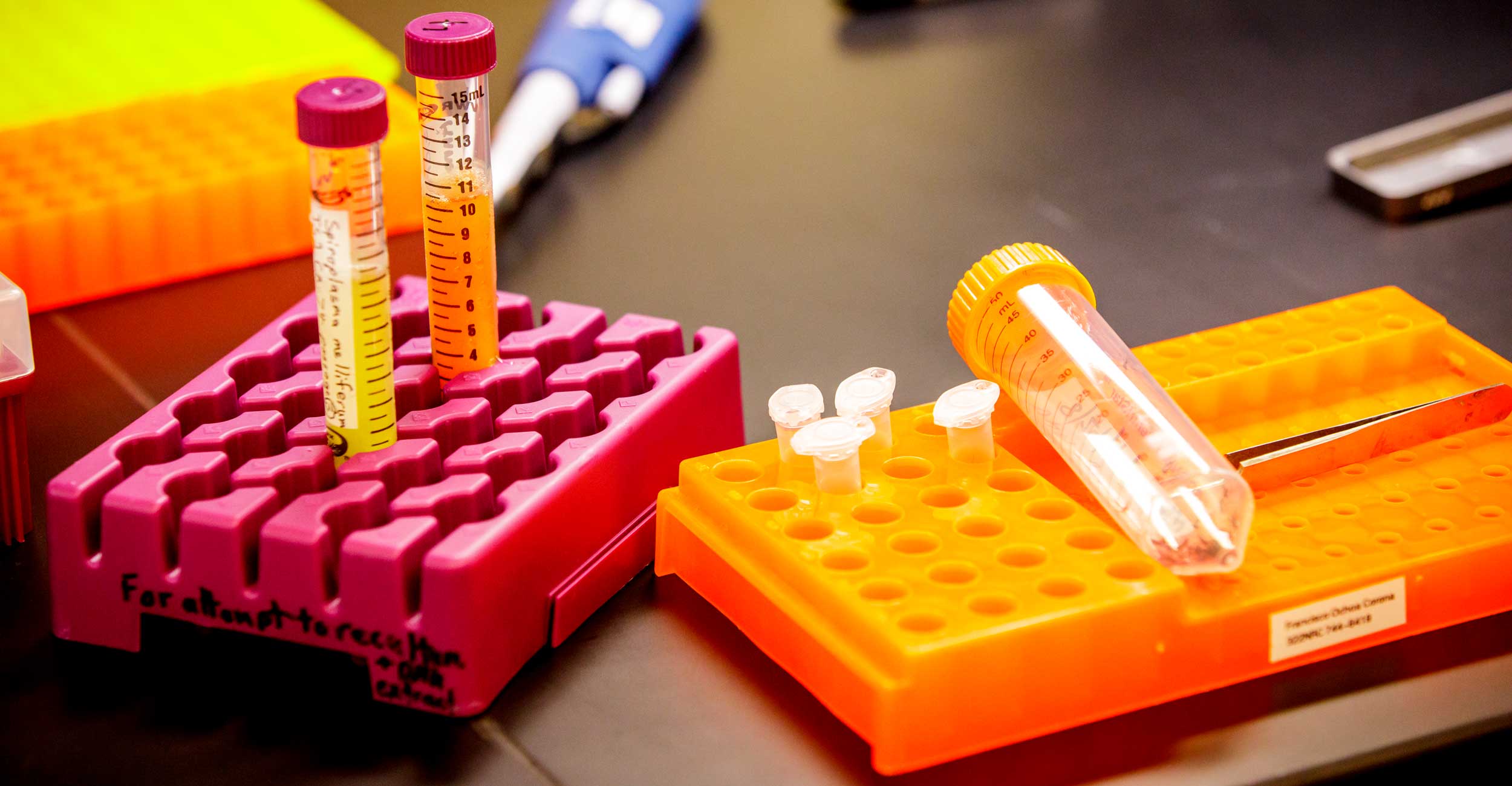
Spring 2024 Niblack Scholars complete their research
Thursday, May 9, 2024
Media Contact: Sydney Trainor | Communications and Media Relations Specialist | 405-744-9782 | sydney.trainor@okstate.edu
For three semesters, Niblack Research Scholars dedicate their time to academic experiences outside the traditional classroom by conducting research in one of Oklahoma State University’s laboratories.
These undergraduate students receive funding that allows them to pursue research that interests them and pays for a mentor to help along the way. Students work two to five hours per week with their mentors in hands-on laboratory environments during fall and spring semesters as well as 20 hours per minimum per week in the summer.
This spring, seven scholars are turning in their research and preparing to return in October to present findings to Dr. John Niblack.
Clauddia Dodd
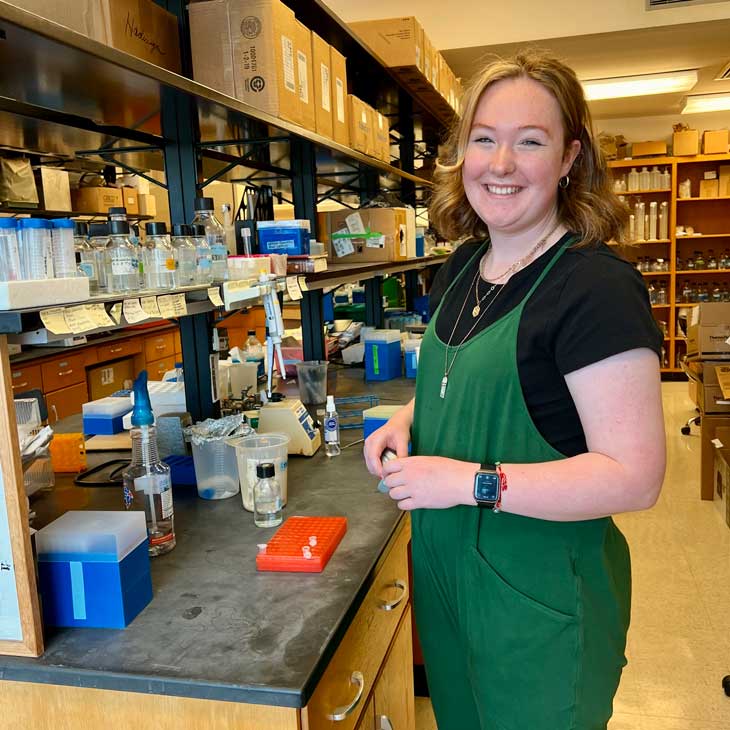
Q: What is the focus/objective of your NRS research project?
A: The focus of my NRS research project is cell signaling. I work on understanding a specific cell signaling tower in Dictyostelium to better understand chemotaxis and cell proliferation.
Q: How has participating in the Niblack Research Scholars program impacted your college
experience?
A: Through my experience with the Niblack Research Scholars program, I have met some
of my closest friends and made many memories. Joining a research lab and working closely
with a lab has been so helpful in making friends and getting work experience.
Q: What advice would you give those considering undergraduate research?
A: My best advice to those considering an undergraduate research opportunity is to pace
yourself. Research, no matter the discipline, is a learning experience the whole way
through, and if everyone were good at it from the very beginning, we wouldn’t need
it. Don’t pressure yourself to try to know everything right at the beginning, take
your time learning and absorbing everything.
Q: Why did you choose Oklahoma State University?
A: I chose Oklahoma State University because my mom always wanted to go to college here, and as a first-generation student, I wanted to carry out a part of her dream for her.
Q: What has been your most memorable/favorite part of OSU so far?
A: My favorite part of OSU is the atmosphere, there is just something about being in Stillwater that is always going to feel like home.
Q: What are your future goals?
A: I plan to attend graduate school in the future and obtain a Ph.D. in molecular biology. I want to work as a molecular anthropologist for different research labs to discover more information about ancient DNA, the evolution of human genetics, and different artifacts.
Faith Howe
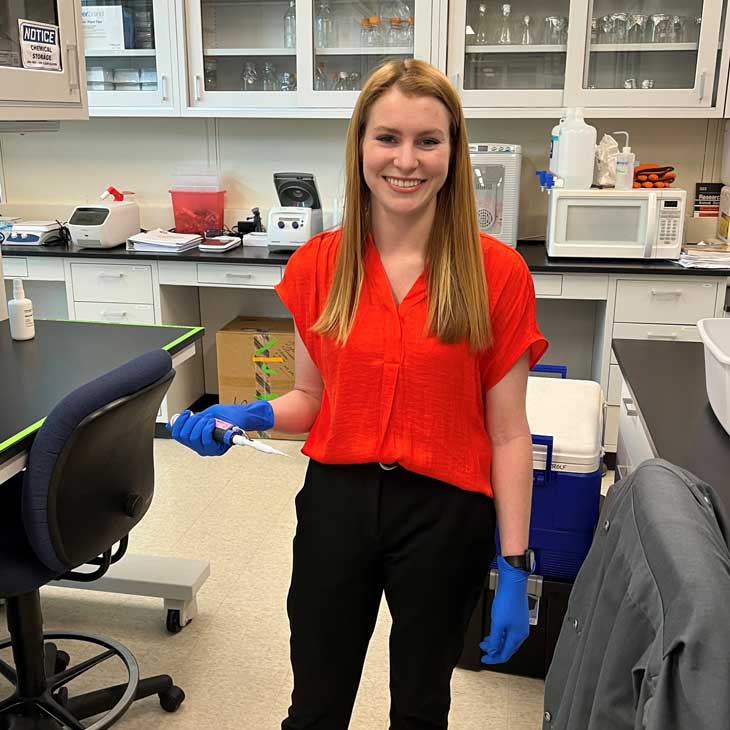
Q: What is the focus/objective of your NRS research project?
A: The objective of my project is to identify transcriptome-wide cell cycle-associated gene dynamics post-knockdown by analyzing the RNA sequencing data post-lncRNA knockdown and identifying the differentially expressed genes. This could allow for the identification of gene pathways affected by the knockdown of each lncRNA, which could provide a better understanding of how lncRNAs dysregulate the cell cycle and contribute to a greater understanding of the function of specific lncRNAs.
Q: How has participating in the Niblack Research Scholars program impacted your college
experience?
A: The Niblack Research Scholar program has given me an invaluable opportunity to
expand my research experience. It has taught me the value of persistence and that
when something doesn’t go as expected, it isn’t a failure unless you stop there. It
is just a redirection to a different solution. It has given me an opportunity to learn
many research techniques as well as skills and knowledge that I would not have had
otherwise, and this has brought a deeper level of meaning and understanding to much
of the coursework I have had in my classes.
Q: What advice would you give those considering undergraduate research?
A: Getting involved in research is one of the best college involvement decisions you
will make. It helps bring meaning to the things you learn about in your classes and
expands that learning beyond what you would get otherwise. Getting involved in research
helps create a strong connection between you, your professors, as well as the graduate
students in the lab. This type of hands-on learning allows you to work on creative
solutions to problems and doing this under the guidance of outstanding research scientists
is the best type of learning available.
Q: Why did you choose Oklahoma State University?
A: I have been coming to OSU since I was 9 for various 4-H horse club contests, Big 3 field days and FFA speech contests. I was familiar with the campus. Many people assumed I would come here because my grandparents, dad and sister graduated from OSU; however, I was encouraged to look around at other universities to be sure that OSU would be a fit for me. As I traveled to other schools, it was obvious that they didn’t compare to OSU and that OSU felt like home. Beyond the connection I felt, OSU has an outstanding reputation for research and research drives innovation.
Q: What has been your most memorable/favorite part of OSU so far?
A: Picking a favorite part of my undergraduate experience at OSU is a very difficult question, but I would have to say the relationships I have developed while I have been here. I have had some professors who have gone above and beyond to help me grow as a student and a person. I have also found my best friends here.
Q: What are your future goals?
A: This fall, I will begin at Colorado State University College of Veterinary Medicine. After graduating with my DVM, I plan to complete an internship and residency in equine surgery. Eventually, I would like to move back to my family’s cattle ranch and practice as an equine surgeon in southern Oklahoma and north Texas.
Kayleen Sugianto
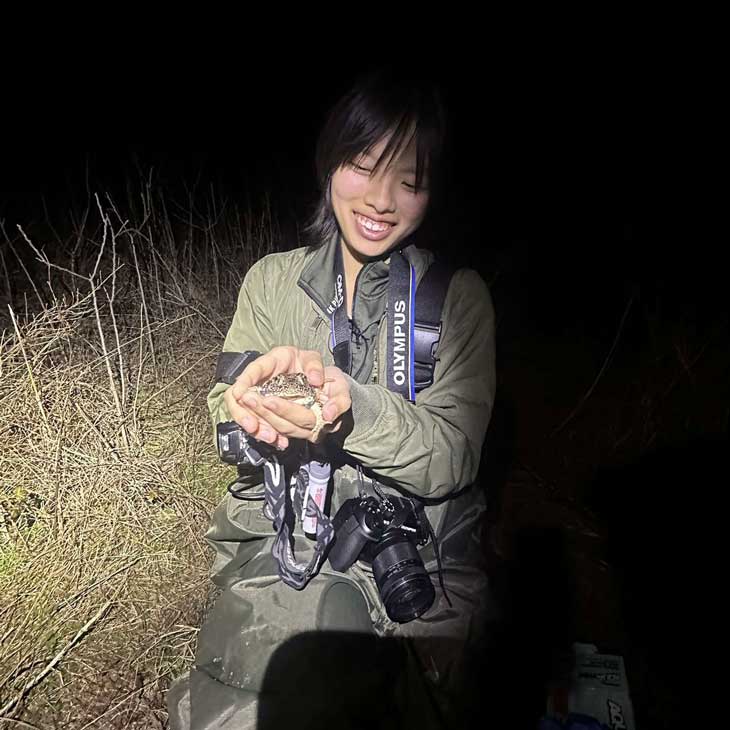
Q: What is the focus/objective of your NRS research project?
A: The focus of my NRS research project is to determine if photographs can be used to identify individual crawfish frogs (Lithobates areolatus), a species of conservation concern, through either their dorsum or tympanum patterns. If successful, this can be provided as a non-invasive technique for accurate population counts in not only this particular species, but others as well. Photo ID has major advantages over traditional marking methods because it is highly accurate, less invasive, expensive and time-consuming.
Q: How has participating in the Niblack Research Scholars program impacted your college
experience?
A: During my time in the NRS program, I have gained experiences that no other has.
The support has helped me to find my passion for research in this growing world and
allowed me to figure out where I want to be after I graduate from Oklahoma State University.
I now have the confidence to present my work, take leaps toward my career goals while
balancing coursework, and connect with others that share the same interest in research
as I do.
Q: What advice would you give those considering undergraduate research?
A: The advice I would give would be to look into research opportunities as soon as
possible and not be afraid to reach out. There is always someone willing to take you
under their wing and they will want the best for you in continuing your path or introducing
you to a completely new one. You have so much potential to achieve what you want most
in life if you put in the effort for yourself. But always remember to take care of
your well-being; you are important in every single way and can only do so much without
prioritizing yourself.
Q: Why did you choose Oklahoma State University?
A: The original reason I chose Oklahoma State University was because of the incredible study abroad program as well as a zoology major degree plan. I am grateful that it just so happens that the university has a wonderfully invested research side as well. After a welcoming tour the summer before my freshman year at OSU, I was excited to join the enthusiastic Cowboy family on the most beautiful, lively campus I have ever seen. From Pete’s Pet Posse to extensive organizations such as the wildlife society, I was truly drawn in from the start.
Q: What has been your most memorable/favorite part of OSU so far?
A: My most favorite and memorable part/s of OSU would be the connections I have made along the way. I have made lifelong friendships, met reliable colleagues and have great relationships with my professors. Without them, I would not be who I am today and so much more. OSU has brought us all together in this sense and I would not ask for anything more than to continue to make them proud.
Q: What are your future goals?
A: My future goals career wise is to become a successful wildlife biologist for herpetology (wildlife diversity biologist or threatened and endangered biologist). At the moment, I am unsure if I would like to proceed in obtaining a master’s degree or just a bachelor’s degree, but either way I am excited to continue my education. My life goal is to make an everlasting impact on others’ lives with my work. I want to create a safe space for a diverse workplace in my field, and help the world progress in conservation efforts and connect everyone with the natural world in harmony.
Therese Tankam
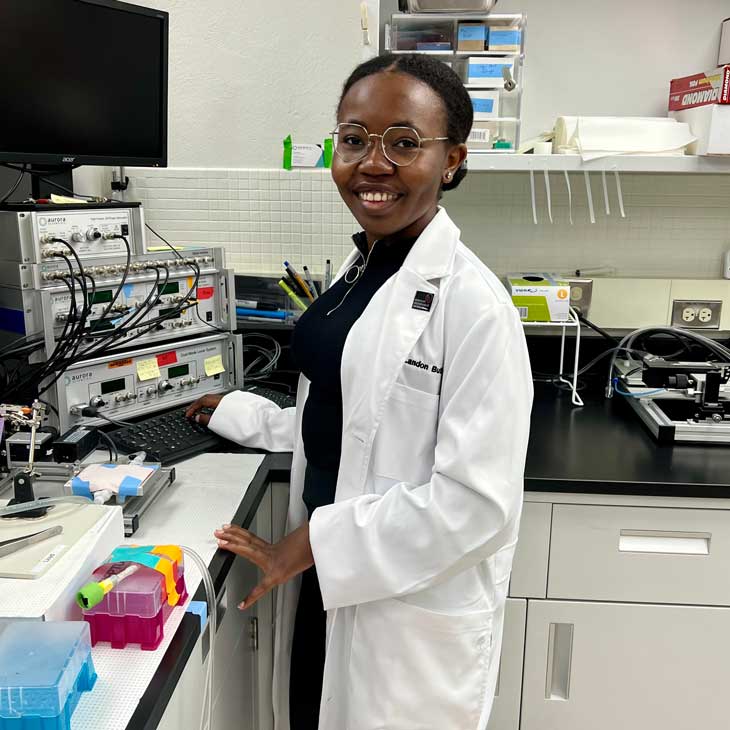
Q: What is the focus/objective of your NRS research project?
A: My research looks at how we can modulate diet to reverse the loss of muscle function in obese individuals. This research aims to find an accessible solution to the problem of obesity and hopefully induce behavioral changes. Through this effort, I hope to find solutions to empower those who seek to better themselves.
Q: How has participating in the Niblack Research Scholars program impacted your college
experience?
A: Becoming a Niblack scholar has fundamentally changed the way I view my college experience.
It has given me an avenue to connect what I have spent the past few years studying
and concretized it into something that could make a difference in the lives of people
around me. It has shown me that the efforts and interest I have consecrated to my
love of science can yield purposeful and attainable solutions that can eventually
make a difference. Ultimately, this program has shown me that efforts and passion
do yield success.
Q: What advice would you give those considering undergraduate research?
A: Pursuing research can indeed be daunting, especially when you don’t have a lot of
previous experience. However, believing that you have something to offer scientific
discourse makes it a lot less daunting. Next, finding your niche, especially in something
that you are passionate about will lead you down a path of both scientific and self-discovery.
I believe anyone who pursues this route brings something new and helps the world be
a little better.
Q: Why did you choose Oklahoma State University?
A: I chose to study at Oklahoma State University due to the vast resources it provides to its students. I wanted to find an environment that would allow me to pursue my academic interest, as well as provide me with several opportunities. Additionally, I wanted to find a school with a strong school spirit and a welcoming campus community. OSU, fit the bill perfectly on all fronts, and as such it was my top choice.
Q: What has been your most memorable/favorite part of OSU so far?
A: So far, my favorite part of OSU has been the people I have met along the way. Almost every person I have met on campus has been delightful and awe-inspiring. There are so many people working hard every day to make their dreams come true, every single one with a different aspiration. Every conversation has taught me something that opens my eyes to a new perspective and a new way of viewing the world.
Q: What are your future goals?
A: I intend to apply to medical school this coming cycle. I wish to continue putting my efforts into the betterment of mankind by becoming a physician. During the time before I attend medical school, I plan to work in a laboratory, to put my degree to use.
Ella McReynolds
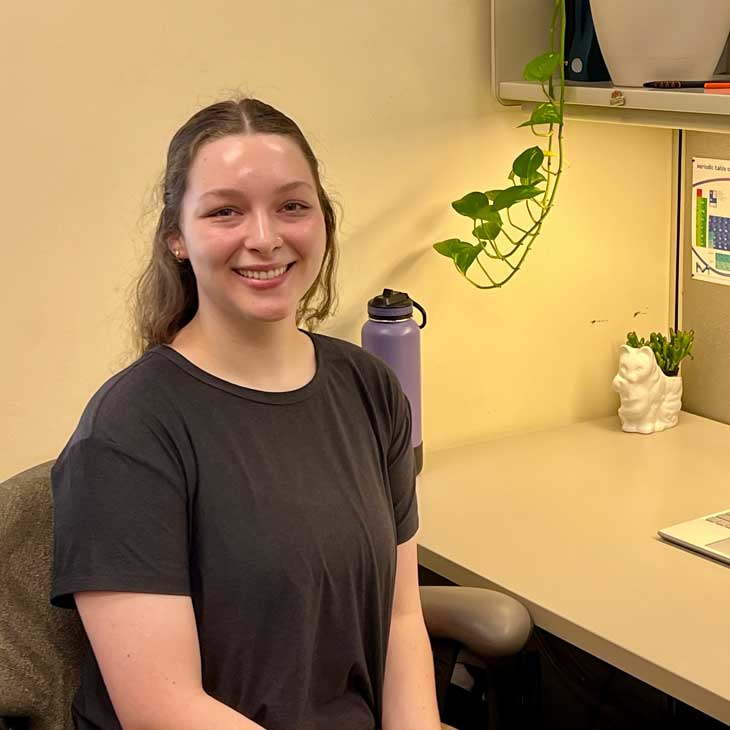
Q: What is the focus/objective of your NRS research project?
A: My project focuses on a phylum of bacteria known as Acidobacteriota. I use bioinformatics to investigate the genomic differences between the bacteria in this phylum that live in soil and non-soil environments. I enjoy investigating the impacts of phylogeny and ecology on the phylum.
Q: How has participating in the Niblack Research Scholars program impacted your college
experience?
A; As a Niblack Research Scholar, I have been able to do a lot related to research
that I had never thought possible. Traveling to conferences and presenting my research
as well as hearing other research was such a unique experience that I would not have
had without this program. I have also had a wonderful time during the day-to-day in
the lab working on my projects and with others.
Q: What advice would you give those considering undergraduate research?
A: Be open to new opportunities. When I started my project, I thought there was no
way I would ever feel confident in my ability to carry these tasks out. After some
time, I have proven myself wrong and am so grateful for the experiences that helped
me do so.
Q: Why did you choose Oklahoma State University?
A: Truthfully, many of my family members went to the other school in Oklahoma, and I wanted to be different; however, I could not be more grateful that I made that choice. The support here has been wonderful, and I have had the most enriching experience here.
Q: What has been your most memorable/favorite part of OSU so far?
A: Making friends and getting involved. It sounds stereotypical, but the experiences I have had with my friends and lab mates have truly enhanced my time here. Additionally, working on campus has allowed me to meaningfully contribute to our campus and help others.
Q: What are your future goals?
A: Soon, I will start a clinical internship in Medical Laboratory Science. After completion, I hope to work as a medical laboratory scientist. I am looking forward to starting this journey and using the things I have learned during my time at OSU and as a Niblack Research Scholar in my career.
Griffyn Stoodley
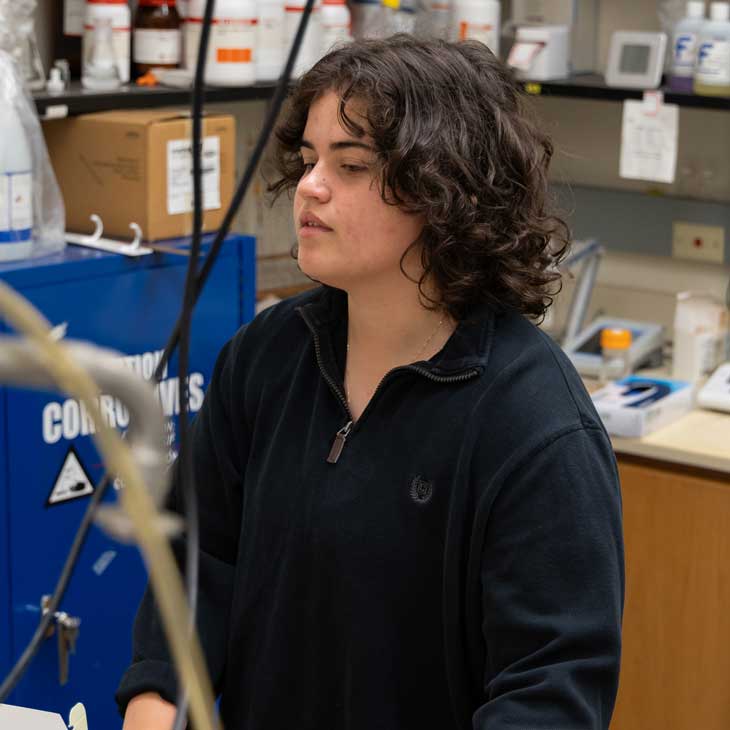
Q: What is the focus/objective of your NRS research project?
A: Adapting 3D printing to create custom devices and medications has seen significant interest in biomedical and pharmaceutical sciences. However, the effect of bioprinting on cells is not well understood. To test the effect on cells, I use galvanotaxis on printed cells. The purpose of my Niblack research project is to understand the role that galvanotaxis plays in the potential morphological changes of elongated 3D bioprinted human astrocytes.
Q: How has participating in the Niblack Research Scholars program impacted your college
experience?
A: My experience as a Niblack Scholar has allowed me to develop many laboratory skills.
On top of this, I have been pushed to grow in my independent academic problem-solving
skills. The development of these skills has allowed me to further excel within my
courses and will serve me well in my future career.
Q: What advice would you give those considering undergraduate research?
A: To those interested in becoming involved in undergraduate research, I would recommend
finding a lab that is going to support and challenge you. Without the support and
guidance from my faculty mentor and graduate student, I would not be where I am today.
Q: Why did you choose Oklahoma State University?
A: I chose Oklahoma State University because of its excellent undergraduate research opportunities. I was accepted into the Freshmen Research Scholar Program, and I really wanted to attend a university that was dedicated to undergraduate research.
Q: What has been your most memorable/favorite part of OSU so far?
A: The most memorable part of my OSU experience so far has been winning the last Bedlam football game. It was such a great game, and so fun to see everyone rush the field at the end. Go Pokes.
Q: What are your future goals?
A: In the future, I would like to attend medical school to become a physician. Currently, I am interested in internal medicine, but I am open to exploring other specialties. I would like to stay involved in research throughout my career.
Trinity McMahon
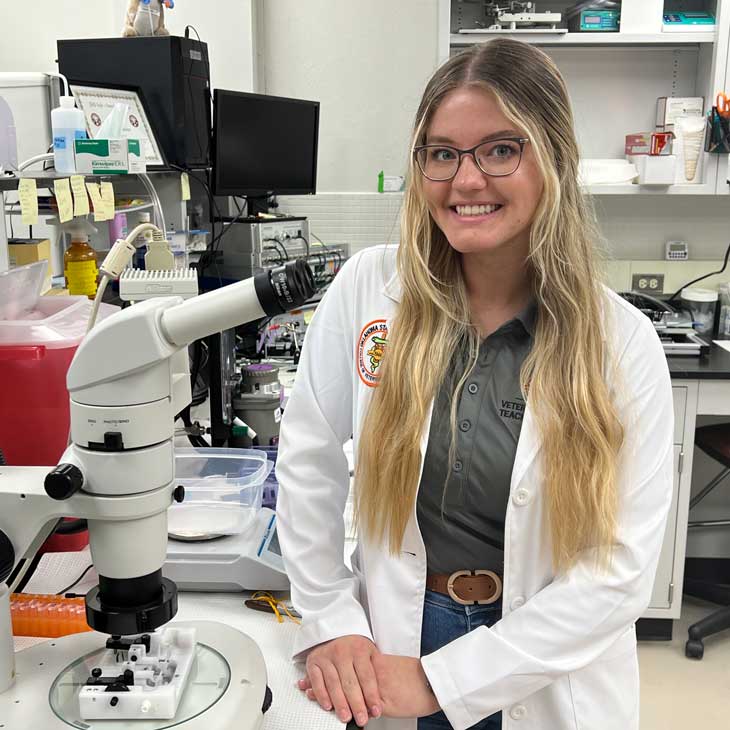
Q: What is the focus/objective of your NRS research project?
A: The objective of my project was to analyze microvascular deterioration across the lifespan in an aging mouse model by isolating the mid-cerebral artery, and the carotid artery and using a cryostat to slice, stain, and then image overlay the vessel cross-section to determine which cell were being affected by oxidant stress across the lifespan (endothelial or smooth muscle cells).
Q: How has participating in the Niblack Research Scholars program impacted your college experience?
A: Being in the Niblack Research Scholars' program has given me lifelong friends and the opportunity to push myself more than I ever thought possible. It has made me more confident in my career choice (vet med) and taught me the importance of persistence and advocating for myself.
Q: What advice would you give those considering undergraduate research?
A: Don't ever be afraid to ask questions or look stupid. Being humble and asking for guidance is going to get you where you need to go. Never stop chasing your dreams, even if they seem impossible.
Q: Why did you choose Oklahoma State University?
A: Because I wanted to pursue veterinary medicine, I wanted to go to an agriculture school with a strong attachment to the world of vet med. I knew that coming here for school would not only help me academically succeed but would also put me in touch with people with a greater wealth of knowledge than my own.
Q: What has been your most memorable/favorite part of OSU so far?
A: The summer portion of the Niblack Research Scholars' program for sure. I got to help out with some of the vet students' summer research projects including work with toads, chickens and cheetahs.
Q: What are your future goals?
A: I want to become a veterinary ophthalmologist. After graduating this May, I hope to attend veterinary school at North Carolina State University College of Veterinary Medicine (I'm still in the process of deciding between them and Kansas State).
Story By: Abigail Cage | abcage@okstate.edu
